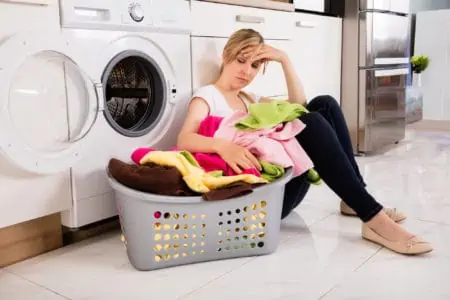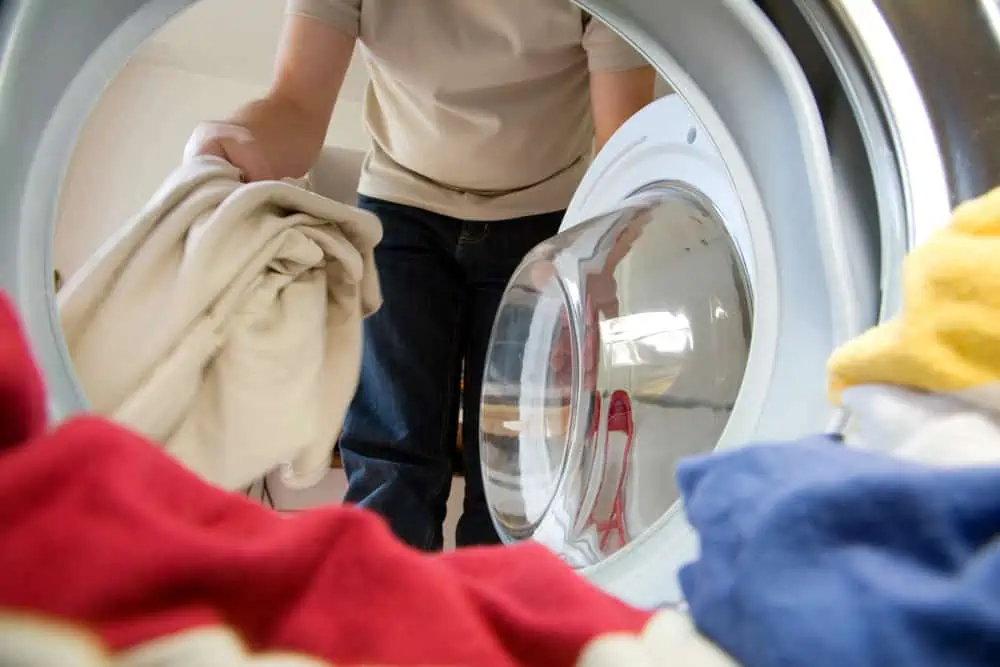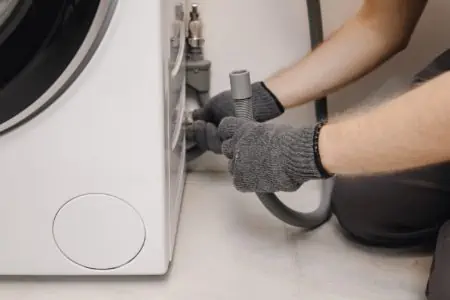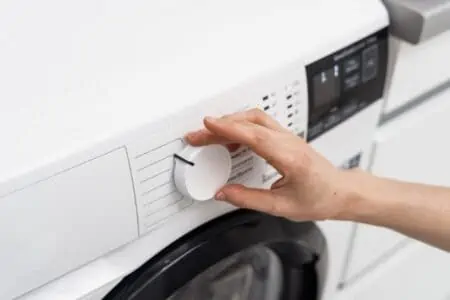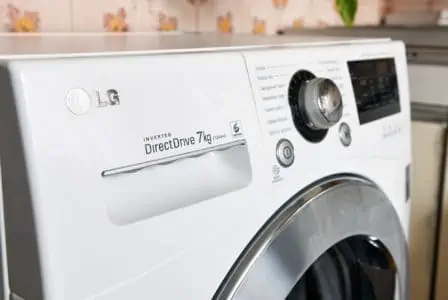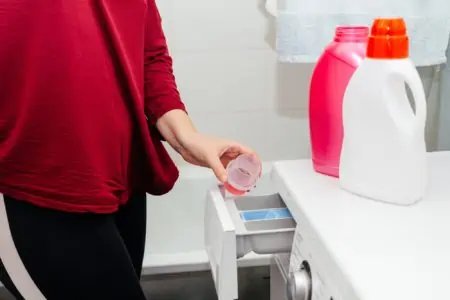Nothing is as frustrating as going to move your laundry into the dryer only to discover that your clothing is still sopping wet. Your washing machine didn’t spin. You’re left with sopping wet clothing that drips all over the floor and will take hours to dry in your dryer.
So today we’re discussing why your washer won’t spin or drain and a few solutions you can try to solve the problem.
Key Takeaways
- An unbalanced load or a not-level washing machine can cause it not to spin properly.
- Check if the washing machine is plugged in or using an extension cord, as it may not receive enough electricity.
- Inspect the drain hose for kinks or blockages that can prevent proper draining and spinning.
- If the issue persists, consider calling a professional to diagnose and fix the problem.
Why Is My Washer Not Spinning?
There are a few common reasons for washing machines to stop spinning. Many of these reasons are simple and easy to fix.
Unbalanced Load
One common reason for a washer not spinning is that you’re washing large and heavy items that are not distributed evenly around the drum. The spin cycle won’t run when the weight is on one side of the washing machine.
Washing Machine Not Level
Another reason a washing machine will not spin is when the washing machine isn’t level. The spin cycle can’t spin properly. Usually, if the machine is not level it will make an extremely loud noise and vibrate when trying to spin.
Machine Plugged In
Occasionally a washing machine will become unplugged during the cycle. If your washer stopped working in the middle of the wash cycle, check to make sure that it’s plugged in. You can also check the breaker as well.
Extension Cord
Washing machines require a heavy-duty outlet so they can receive enough electricity to run. If you have your washing machine plugged into an extension cord, your machine won’t be able to draw enough electricity which may cause the motor to overheat and turn off. The machine will likely work again once the motor cools down.
The extension cord will also reduce the life of your machine.
Too Much Foam
If you have a High Efficiency (HE) machine, then you will need to use HE detergent in your machine that doesn’t foam. The sensors in your washer will sense the foaming of regular detergent and think that the machine is too full.
Then the washer won’t spin correctly and will leave you with wet clothing.
Kink In Hose or Blockage in Drain System
Every once in a while you may have a kink in your drain hose that will prevent water from draining properly. Another issue may be that a small object such as a coin, key, or button became lodged in the hose.
This will eventually cause a blockage that will also prevent your washer from draining properly.
Why Won’t My Washing Machine Agitate and Spin?
There are times when a washing machine will neither agitate nor spin.
Motor Coupling
If you overload your washing machine, your washing machine may not agitate or spin. The motor coupling fails so that you won’t burn out your washer’s motor or transmission.
Motor couplings also wear out after a time, so your motor coupling may have failed because it broke and needs to be replaced.
Belt Drive
One reason that your washing machine will neither agitate nor spin is if your belt drive broke or fell off the pulley wheel. The solution is to remove the back of the washing machine and check the pulley. Be sure to read your user manual for your machine’s specific instructions on how to check the pulley wheel.
You may be able to put the belt back on the pulley wheel. If the belt is broken, you will need to replace it with one made specifically for your make and model.
Spin Switch
Another reason that a washing machine will not agitate or spin is if the lid is open. This is a safety feature to prevent people from being injured by a high spinning or agitating machine.
Sometimes the spin switch gets bent or breaks. Leave your lid open and manually press the spin switch. If the washing machine starts spinning, then you know the spin switch is damaged and will need to be repaired or replaced.
How Do You Fix a Washer That Won’t Spin?
If your washer won’t spin, start troubleshooting by checking for one of these simple reasons. Often you can quickly and easily solve the issue without needing to call a professional to fix your washing machine.
Power Supply
One of the first things you should check if your washing machine won’t spin is that it’s receiving the electricity it needs. Make sure it’s plugged in and the breaker hasn’t been thrown.
Also, check to see if the washing machine is plugged into the electric socket or if it’s using an extension cord. Extension cords are unable to draw enough electricity for washing machines so your machine may be overheating and shutting off.
Move your washing machine so it’s plugged into the heavy-duty outlet. If that’s not possible, call an electrician to rewire the plug so that you can plug your washer into a heavy-duty outlet.
Unbalanced Load
If the load is unbalanced, try rearranging the clothing within the washing machine. We’ve found it sometimes takes several tries to rebalance the load correctly so the washing machine will spin correctly.
It also helps to remove some of the clothing, redistribute the items, and spin smaller loads if possible.
Washing Machine Not Level
If your washing machine isn’t level, you may need to adjust the legs of your washing machine until it is level. Most washing machines have adjustable leveling legs in the front. Adjust the legs to the correct height. Then tighten the lock nut to hold everything in place.
Check to see if your machine also has adjustable legs in the back. If so, adjust these legs as well.
Blockage Causing Washing Machine Not Spinning
Pull your washing machine away from the wall to see if there’s a kink in your washing machine’s hose. If so, gently straighten the kink.
Also, check to see if there’s a blockage in the hose caused by a small object becoming lodged in the hose, and if you see one, remove it. You can access the drain pump from the back of the washing machine. Be sure to check your user manual to learn the specifics of how to check the drain pump.
Carefully push your washing machine into the wall again taking care that you don’t kink the hose.
When to Call In a Professional
There are times to call in a professional to look at your washing machine. For instance, if your machine starts to smell like something is burning or repeatedly makes a new sound.
Other times to call a professional is when there’s excess moisture showing up around your machine. This is a sign of leaking. Also, call a professional if your washing machine is showing intense wobbling or shaking and you’re not able to fix the problem yourself.
You should also call in a professional if you’re not confident in repairing your washing machine yourself as you could make the problem worse. Also, you will need a professional to repair a worn motor coupling, a bad clutch, or adjust a motor mounting plate.
How Long Do Washers Last?
Typical top load washers last for 10-13 years. A front load washer usually lasts for 10 years.
Most new washing machines come with a manufacturer’s warranty that will last for several months.
| Washing Machine Manufacturer | Average Warranty |
| Samsung | 24 months |
| Whirlpool | 1 year from date of purchase |
| Maytag | 1 year limited manufacturer’s warranty |
| LG | 2 years |
| GE | 1 year |
| Kenmore | 1 year |
| Hotpoint | 12 months |
| Insignia | 1 year |
Is It Worth Fixing a Washing Machine?
Before paying to have your washing machine repaired, take some time to consider if this is your best option. Sometimes it’s more cost-efficient to replace your old washing machine than it is to repair it.
Age of Machine
How old is your washing machine? A new machine is not likely to need many repairs over the next few years once it’s fixed. Also, a new machine may still be under warranty so the company will either pay for the repair or replace it.
However, an older machine will be starting to wear out. It will need more repairs, so it may be time to consider replacing the machine.
Another factor to consider when looking at the age of your machine is its efficiency. A new machine is more energy and water efficient than an older machine. You will likely save money on the monthly bills if you replace your older machine.
Issue Involved
Another consideration is the issue that’s causing your machine not to work. A simple issue such as a slipped belt, pump replacement, or problem with a seal may be inexpensive. You may also be able to fix the problem yourself.
However, if you’re dealing with a more extensive and expensive problem then you’ll likely need to replace your machine.
Repair Cost
When you’re considering whether you should fix or replace your washing machine, the first consideration is the cost to repair your current washing machine. The rule of thumb is to repair your machine if the cost is less than 50% of the cost of a new machine.
If the cost to repair your old washing machine is more than 50% of the cost of a new machine, you should consider replacing your machine.
Consider your budget. Can you afford a new machine at this time? If not, repairing your old machine may be the best option.
How Much Does It Cost to Fix an Agitator?
It costs between $350 and $575 to fix or replace a washing machine agitator.
FAQs
Washing Machine Not Spinning Properly
If you discover that your washing machine won’t spin, first check to see if there’s a simple reason why. You may find that the load was unbalanced, the machine became unplugged, or there’s a blockage in the drain hose. Fix the problem and your washer should start spinning again.
